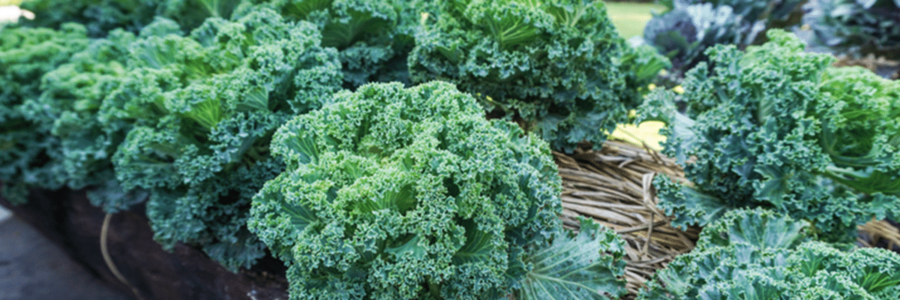Kale, often hailed as a nutritional powerhouse and labeled a “superfood,” has garnered immense popularity for its rich nutrient profile, boasting essential vitamins, minerals, and antioxidants. While it undeniably offers numerous health benefits, including addressing the health concerns of raw kale and unveiling the less-talked-about downsides of consuming it in large quantities is crucial.[1]
The Nutritional Bounty of Kale
- Vitamins and Minerals: Kale is celebrated for its array of vitamins, including Vitamin K, vital for blood clotting; Vitamin A, essential for vision and immune function; and Vitamin C, promoting skin health and boosting immunity.[2-3-4]
- Antioxidants: Kale is a goldmine of antioxidants such as quercetin and kaempferol, effectively combating free radicals, reducing oxidative stress, and lowering the risk of chronic diseases like cancer and heart disease.
- High Fiber Content: Kale’s high fiber content plays a significant role in digestive health, improving bowel movements, regulating blood sugar, and aiding weight management by promoting satiety.
Why Raw Kale Can Pose Health Risks
- Oxalates and Kidney Stones: Kale contains oxalates, naturally occurring substances that, when consumed excessively, can contribute to the formation of painful kidney stones, necessitating medical intervention.[5]
- Goitrogens and Thyroid Function: Raw kale contains goitrogens, compounds that may interfere with thyroid function, potentially leading to an enlarged thyroid gland and hormonal imbalances.[6][7]
- Digestive Issues: While fiber benefits digestion, excessive raw kale consumption may cause digestive discomfort, gas, and bloating for some individuals.[8]
Safely Incorporating Kale into Your Diet
1. Cooking Methods:
To mitigate potential risks, consider cooking kale. This reduces oxalate and goitrogen levels, making it safer for those concerned about kidney stones or thyroid issues.[9] Steaming, sautéing, or roasting kale can also enhance nutrient bioavailability.
2. Moderation:
As with any food, moderation is key. Enjoy kale in reasonable quantities, rather than daily, to prevent the accumulation of harmful compounds. Maintain a varied diet rich in diverse fruits, vegetables, and food groups for balanced nutrition.
3. Consult Your Healthcare Practitioner:
Individuals with pre-existing health conditions or taking medications that might interact with kale (such as blood thinners) should consult healthcare professionals for personalized dietary guidance.
Conclusion
Kale undoubtedly offers many health benefits, but it is essential to recognize the potential health risks, including the health concerns of raw kale, associated with excessive consumption in its raw form. You can harness its advantages while minimizing drawbacks by cooking kale, practicing moderation, and seeking professional advice when needed. Informed choices about kale’s pros and cons empower you to make healthier dietary decisions.
References:
- Caitlin Terpstra, R.D. “Kale: Discover Superfood Secrets.” Mayo Clinic Health System, 17 Mar. 2023, www.mayoclinichealthsystem.org/hometown-health/speaking-of-health/the-many-types-and-health-benefits-of-kale.
- “Vitamin K.” The Nutrition Source, 7 Mar. 2023, www.hsph.harvard.edu/nutritionsource/vitamin-k/.
- “Office of Dietary Supplements – Vitamin A and Carotenoids.” NIH Office of Dietary Supplements, U.S. Department of Health and Human Services, ods.od.nih.gov/factsheets/VitaminA-Consumer.
- Carr, Anitra C, and Silvia Maggini. “Vitamin C and Immune Function.” Nutrients vol. 9,11 1211. 3 Nov. 2017, doi:10.3390/nu9111211
- Mitchell, Tanecia et al. “Dietary oxalate and kidney stone formation.” American journal of physiology. Renal physiology vol. 316,3 (2019): F409-F413. doi:10.1152/ajprenal.00373.2018
- Babiker, Amir et al. “The role of micronutrients in thyroid dysfunction.” Sudanese journal of paediatrics vol. 20,1 (2020): 13-19. doi:10.24911/SJP.106-1587138942
- Felker, Peter et al. “Concentrations of thiocyanate and goitrin in human plasma, their precursor concentrations in brassica vegetables, and associated potential risk for hypothyroidism.” Nutrition reviews vol. 74,4 (2016): 248-58. doi:10.1093/nutrit/nuv110
- Ho, Kok-Sun et al. “Stopping or reducing dietary fiber intake reduces constipation and its associated symptoms.” World journal of gastroenterology vol. 18,33 (2012): 4593-6. doi:10.3748/wjg.v18.i33.4593
- López-Moreno, M., et al. “Antinutrients: Lectins, Goitrogens, Phytates and Oxalates, Friends or Foe?” Journal of Functional Foods, vol. 89, 2022, p. 104938, doi:10.1016/j.jff.2022.104938.


